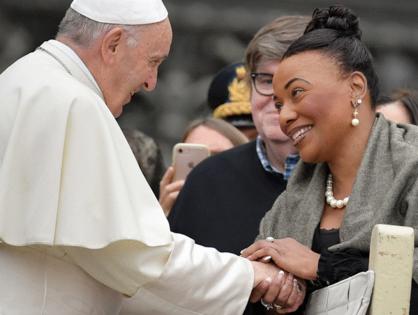How Martin Luther King Jr.'s 'dream' inspired the Vatican through Pope Francis
Published in News & Features
ATLANTA — Bernice A. King has never been one for protocol, especially when she has good intentions.
So when she found herself in the Vatican on March 12, 2018, in a private, quiet moment with Pope Francis, the daughter of Rev. Martin Luther King Jr. asked him a question.
“I leaned in to ask him was there anything I could do for him,” Bernice King recalled.
The pontiff looked at her and whispered, “Pray for me.”
Continuing to break protocol, she asked if she could pray at that moment.
“Imagine that, a Protestant female minister asking to pray for the highest spiritual leader in the Catholic Church,” King recalled.
King prayed for Pope Francis’ health.
A few months later, King greeted the pope at St. Peter’s Square and reminded him of the prayer.
“I remember,” he told her.
The two meetings, brief, but impactful, served as bookends to a more than 50-year relationship between the Vatican and the King family legacy.
The Vatican announced that Pope Francis died early Monday morning at the age of 88. Hours earlier, he appeared in a wheelchair to bless tens of thousands of people in St. Peter’s Square for Easter Sunday.
“I had a profound respect for his leadership and teachings that always came out of an authentic heart of love,” Bernice King said, in a post pinned across her social media accounts. “His loss, at this time in the state of our world where freedom, justice and democracy are being daily undermined, leaves a huge moral void.”
In a 2020 article in the Vatican News, following the death of George Floyd, acclaimed journalist Alessandro Gisotti wrote that the spirit of King’s “dream” and desire for the full rights of African Americans in the United States, which King famously spoke of in his historic “I Have a Dream,” speech at the 1963 March on Washington, “has found passionate support from Pope Paul VI to Pope Francis. They have held up Dr. Rev. Martin Luther King Jr. as an example worth following in the nonviolent fight for equality.”
“I think everybody in the world was influenced by the ‘I Have a Dream’ speech, because it is so generally Judeo-Christian,” said former Atlanta mayor and King confidant Andrew Young. “It touches on everybody’s faith without being conscious of it. It was the universality of Man seeking good.”
On Sept. 18, 1964, King met for 25 minutes with Pope Paul VI in his private library in the Vatican.
There, the pope encouraged the Baptist minister from Atlanta to continue his peaceful commitment to nonviolence against racial discrimination.
“The Pope made it palpably clear that he is a friend of the Negro people and asked me to tell the American Negroes that he is committed to the cause of civil rights in the United States,” King said later.
“I think new days have come when a Pope meets a fellow who happens to have the name Martin Luther.”
A month later, it was announced that King would receive the Nobel Peace Prize.
Since that 1964 meeting, the men who succeeded Pope Paul VI to the papacy have often quoted King’s words while drawing inspiration from his work.
In 1987, on a trip to New Orleans where he met with the city’s Black Catholic community, Pope John Paul II spoke of the “providential role” King played in civil and human rights.
“In the most difficult hours of your struggle for civil rights amidst discrimination and oppression God himself guided your steps along the way of peace,” Pope John Paul II said.
“Before the witness of history, the response of nonviolence stands, in the memory of this nation, as a monument of honor to the Black community of the United States.”
In 2008, on a visit to Washington, D.C., Pope Benedict XVI said faith in God had been “a constant inspiration and driving force” in the struggle “against slavery and in the civil rights movement” led by King.
Two days later, at an ecumenical celebration in New York City, the pope repeated those words to Bernice King.
In his 12 years as the head of the Catholic Church and the first pontiff from Latin America, Pope Francis visited the U.S. only once.
In 2015 he addressed a joint session of Congress. In that speech, he evoked Abraham Lincoln and praised Rev. Martin Luther King Jr.’s dream of “liberty in plurality and non-exclusion.”
“I think of the march which Martin Luther King led from Selma to Montgomery 50 ago, as part of the campaign to fulfill his ‘dream’ of full civil and political rights for African Americans,” Pope Francis said.
“That dream continues to inspire us all. I am happy that America continues to be, for many, a land of ‘dreams.’ Dreams which lead to action, to participation, to commitment. Dreams which awaken what is deepest and truest in the life of a people.”
Throughout his speech, Pope Francis continued to reference King’s dream. Before blessing America at the close of the speech, “dream” was his final word.
“A nation can be considered great when it defends liberty as Lincoln did, when it fosters a culture which enables people to ‘dream’ of full rights for all their brothers and sisters, as Martin Luther King sought to do,” Pope Francis said.
“In these remarks I have sought to present some of the richness of your cultural heritage, of the spirit of the American people. It is my desire that this spirit continue to develop and grow, so that as many young people as possible can inherit and dwell in a land which has inspired so many people to dream.”
_____
©2025 The Atlanta Journal-Constitution. Visit at ajc.com. Distributed by Tribune Content Agency, LLC.







Comments